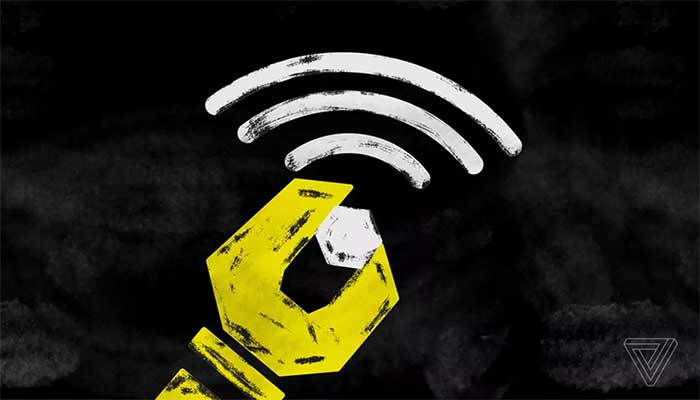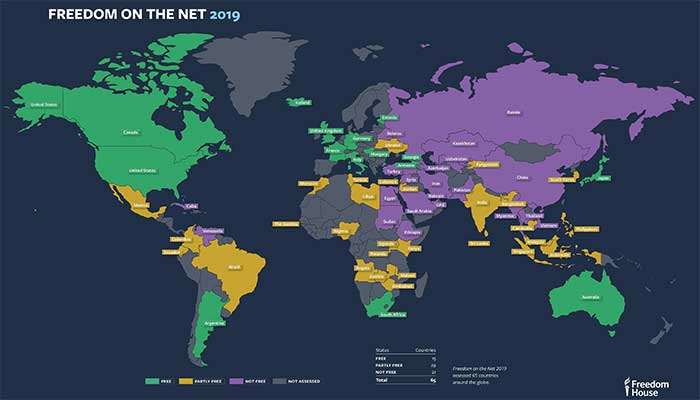Internet freedom declines in Pakistan: report
Freedom House says decline is due to increased blocking of political, social, and cultural websites
November 05, 2019

KARACHI: Internet freedom has declined in Pakistan due to the increased blocking of political, social, and cultural websites, said human rights watchdog Freedom House in its annual report on internet freedom across the world.
The Freedom on the Net report has labelled Pakistan as not free in terms of internet freedom, amid a global internet freedom decline for the ninth straight year. The report focused on activities from June 2018 till May 31 of this year.
The report said, “Internet freedom declined during this report’s coverage period due to authorities’ increased blocking of political, social, and cultural websites.”
The watchdog also said that there were connectivity restrictions and increased disinformation in the 2018 general election. It also highlighted that, the authorities have ‘upped’ their efforts to silence critical journalists and activists using various tools.
Also read: Pakistan to deploy nation-wide internet monitoring system: report
It also lamented that internet users were sentenced to death on charges of posting blasphemous content online. But it did highlight that the convictions are still under appeal.
Among its key findings the report noted that the Pakistani authorities had shut down mobile and internet service during protests and in the lead-up to the July 2018 general elections.
The report also highlighted that over 800,000 websites were blocked, including political, religious, and social content.
The report said that bots supporting various political parties emerged before the July 2018 general elections.
The organisation also said, “The government increased social media monitoring, announcing a new system to target extremism, hate speech, and antinational content.” It noted that the announcement came a month before the Interior Ministry launched an investigation into journalists and activists supporting murdered journalist Jamal Khashoggi on social media.
It also noted that activists and bloggers faced physical attacks and death threats from June 2018 till May 2019.
To determine the countries rating on its index Freedom House used three parametres to assess a country which were obstacles to internet access, limits on content and violations of internet users’ rights.
Under this Pakistan was able to manage a score of 5 out of 25 in the first category, 14 out 35 in limits on content, and 7 out of 40 on violations of user rights; managing an overall score of 26/100 which was worse than its 2018 standing which stood at 27/100.
‘Obstacles to access’
In its assessment of obstacles to internet access, the report highlighted that Pakistan’s underdeveloped infrastructure has caused problems in internet penetration rates, especially in the rural areas. But it did mention that mobile internet access is increasing in the country.
It also discussed the disabling of the internet access during times of “perceived unrest” and the long-term denial of service in country’s marginalised areas persisted.
‘Limits on content’
Freedom house emphasized that social media platforms, communication tools, and other online tools contribute to a vibrant online space. But it noted that the online content is restricted in Pakistan under the Prevention of Electronic Crimes Act (PECA).
The report said, “Blocking of political content without transparency continued during the reporting period, including of websites relating to the general election. Disinformation and manipulated content continued to proliferate online, also ramping up around the vote.”
‘Violations of User Rights’
The report deplored that PECA and other laws have restricted users’ rights, adding that their rights were frequently violated during the report’s coverage period.
Freedom House expressed concerned over the government’s surveillance and social media monitoring and the continued lack of data protection laws in the country. The report also said that users continue to face intimidation, blackmail, and at times violence, in response to online activity.
Global outlook

The Freedom House report found evidence of "advanced social media surveillance programs" in at least 40 of 65 countries it had analysed.
The report said global internet freedom declined for a ninth consecutive year, as authorities in some countries simply cut off internet access as part of their manipulation efforts, while others employed propaganda armies to distort information on social platforms.
"Many governments are finding that on social media, propaganda works better than censorship," said Mike Abramowitz, president of Freedom House.
"Authoritarians and populists around the globe are exploiting both human nature and computer algorithms to conquer the ballot box, running roughshod over rules designed to ensure free and fair elections."
Disinformation was the most commonly used tactic to undermine elections, according to the group.
Also read: Warning issued over attacks on internet infrastructure
"Populists and far-right leaders have grown adept not only at creating viral disinformation, but also at harnessing networks that disseminate it," said the report.
China remained the world's worst abuser of internet freedom for the fourth consecutive year as the government stepped up information controls amid protests in Hong Kong and ahead of the 30th anniversary of the Tiananmen Square massacre, the report said.
Online freedom declined in 33 of the 65 countries assessed, including the United States, the survey found.
The biggest declines were in Sudan and Kazakhstan, followed by Brazil, Bangladesh, and Zimbabwe. Improvements were measured in 16 countries, with Ethiopia recording the largest gains.
With additional input from AFP











